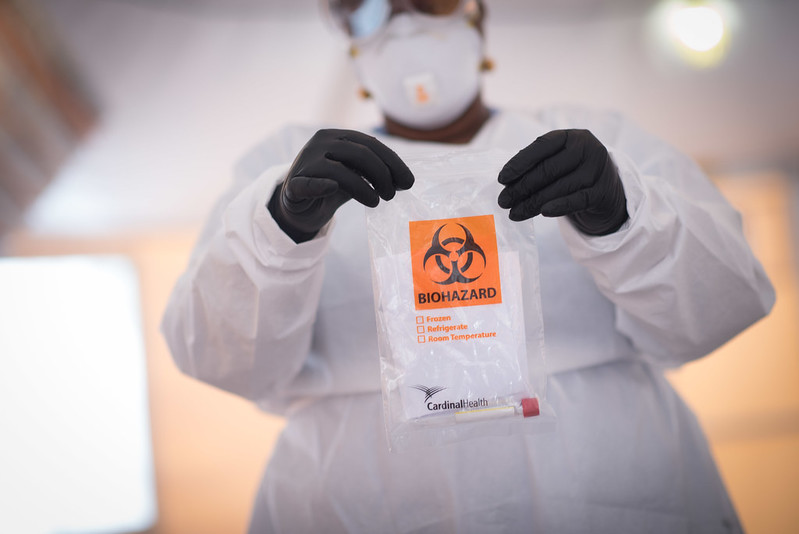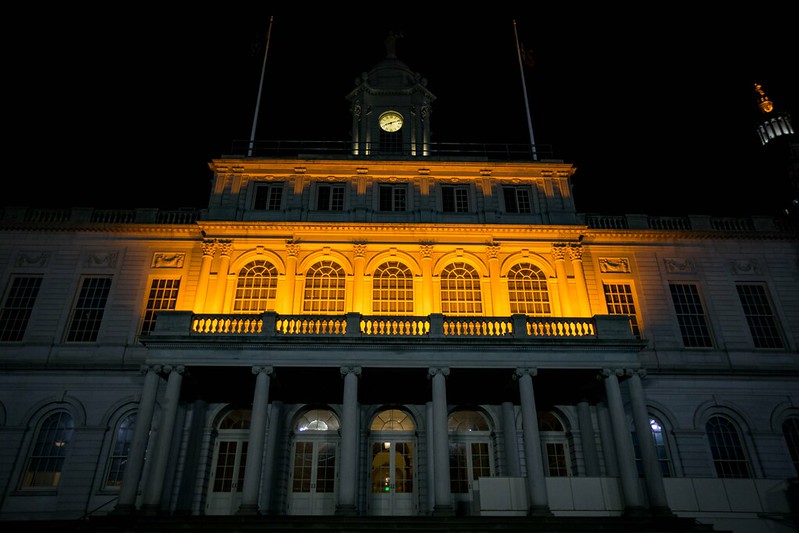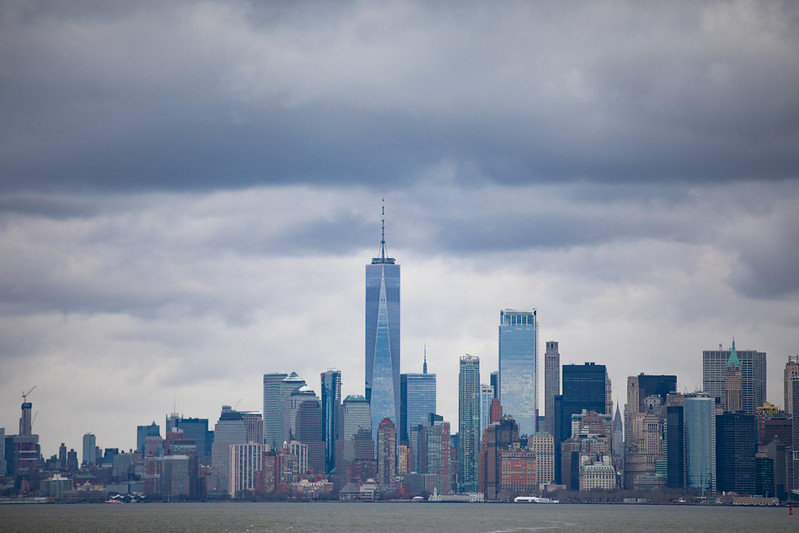Why the Science Around COVID-19 Keeps Changing So Much and a Vaccine Can’t Be Rushed

Covid testing in New York (photo: Michael Appleton/Mayor's Office)
We are now more than halfway through October, it’s been seven months since New York State went on PAUSE and President Trump continues to tout unrealistic ideals of the speed scientists will be able to create a vaccine for COVID-19. In the first presidential debate and since, Trump continues to show a true misunderstanding of scientific research. In order to make good choices to avoid more covid spikes and prolonged suffering, allow students to return to school safely, and more fully resume life before coronavirus, we must understand the speed and process of scientific research -- and let it take its course responsibly.
We have learned a lot in seven months. On March 22, we knew relatively little about how the disease was being transmitted, what we could use to treat it, and what the long-term impacts of the disease were. And yet, politicians had to make choices to protect their constituents, cities, and states. We will need to put what we have learned to the test to avoid a second wave in New York and more infection spikes across the country, and we must allow the scientific process to unfold.
The early response to COVID-19 in New York, unaided by the federal government, has widely been considered a mess. This disaster highlights the complications of making what should be science-based policy before the scientific research is performed or vetted. This pandemic draws attention to the need for transparency, communication of changing information, and public understanding of the speed and nature of scientific research.
Scientific research is built for discovery over time, not rapid speed. The key to understanding why the early guidance on COVID-19 changed repeatedly lies in understanding the method of scientific research and peer review. This applies to figuring out how COVID-19 spreads, the importance of mask-wearing, and the development of a vaccine, among other key pieces of the larger puzzle of a new, deadly virus.
In reality, a published scientific study that can accurately provide findings typically starts many years before it is disseminated. Publication is the end goal for scientists to share the results of their carefully-performed and -vetted research, including rigorous peer-review commentary. Proper design helps to plan out experiments that will reach the estimated goal in a timely manner. Studies must be funded. Biological studies can take many months to years to complete the necessary experiments and statistical analyses.
In the case of COVID-19, many important logistical steps, like funding, may be fast-tracked, but even with widespread desperation for a vaccine, scientific research cannot and must not be rushed. As vaccines proceed through development stages, other research works in parallel understand the complex new virus.
One or more COVID-19 vaccines will eventually go through the federal Food and Drug Administration process. The scientific research involved will also be published in scientific journals at various points including, exploratory research, preclinical models, and clinical trials. Again, this highlights the importance of greater general public understanding of the underpinnings of how so much of the research into COVID-19 and other science typically happens.
Scientific manuscripts -- usually defined as full research articles with novel findings -- must include background, motivation, methods, results, and discussion of how the work fits into the broader scope of the relevant literature. When completed, the manuscript is submitted to a journal where it goes through the process of peer review, described by Elsevier as existing to “validate academic work” and “improve the quality of published research.” Other scientists review the paper in a process that can take from a few weeks to several months, providing feedback on process and conclusions. Based on the peer review, the paper can be rejected or accepted by the journal.
If accepted with revisions, the scientists complete additional experiments, analyses, and writing before resubmission and more review. The article is finally published -- signifying necessary academic quality -- after the final round of revisions is complete. This is usually at least a year after the initial experiments were performed.
During the pandemic, scientists have been working around the clock at speeds not normally observed in biomedical research to attempt faster discoveries of many things including the genetic make-up of the virus, how the virus is transmitted, treatments, and vaccines.
Scientists didn’t initially recommend against masks because they didn’t want to control the virus, or because masks don’t help. Scientists didn’t recommend wearing masks due to some combination of not understanding the mechanism of COVID-19 spread, wanting to avoid N95 mask supply issues, and assumptions of low disease presence. Studies have now found that the virus can be transmitted before symptoms or while asymptomatic, and some studies like one from Alvin Ing show as many as 80% of cases could be asymptomatic. We know more about the virus now, and that helps scientists and policy-makers to make educated choices about masks.
In the last six months, because of scientists, we have learned how vital masks are to decreasing transmission. We have also learned that hydroxychloroquine provides no benefit to COVID-19 patients. Scientists have also developed new testing methods for COVID-19, including a saliva test recently approved by the New York State Department of Health.
When things are moving at pandemic speed, we need to search out the knowledgeable scientific voices that we know guide the public in the right direction, but more importantly we need transparency on changing science. Transparency and communication are key to combating public health crises. COVID-19 will not have a miracle cure. It will have a cure that is developed and tested by hard-working scientists working faster than ever imagined.
Guidelines changing are not a sign of misinformation and false ideas, but rather a symptom of evolving scientific understanding of the virus. It will be a long time, certainly years, before we truly understand the complexities of this novel coronavirus. To avoid another wave while we wait for tireless scientists to develop a safe vaccine, we must listen carefully to those who are on the frontline learning more about the virus every day.
***
Samantha L. Marshall, PhD, is a postdoctoral research scientist in Orthopedic Surgery at Columbia University Medical Center in New York, NY and a volunteer with Sci4NY.
***
Have an op-ed idea or submission for Gotham Gazette? Email This email address is being protected from spambots. You need JavaScript enabled to view it.
I Am A Black Lobbyist; My Profession Must Change

New York City Hall (photo: Benjamin Kanter/Mayoral Photo Office)
The Friday after George Floyd was murdered, I sat in my Harlem apartment seething. For the first time since 2012 I could not join the protests. The lobbying firm I worked for asked me to review a City Council hearing and take notes for a client. No capacity to pay attention, I just took the notes.
Civil rights organizations spoke, law enforcement agencies followed, one legislator after another yelled louder than the previous about racism, the prison industrial complex, and companies making ungodly amounts of money from this system. One of these groups was a client that we worked with on different issues. But, as the hearing was nearing the end, the company I was taking notes for was called out by name for charging exorbitant fees and fines to families with incarcerated loved ones. It stopped me in my tracks. My confusion turned into a blinding rage.
As a Black man in America, I long ago learned the ugly history of our prison system. I know vagrancy laws criminalized former slaves unwilling to work on plantations. I know Black people were jailed for perceived disrespect of white folks. We went to jail for voting. And whenever a person goes to jail every part of the process from arrest to probation becomes a money grab by the state and corporations.
I know this because at that exact moment one of my siblings sat in a jail cell. During a mental health crisis in the winter of 2019, they ended up in jail after an altercation. They refused to speak to my family or their lawyer. What should have been an evening in jail turned into a few days, then a few weeks, then a few months. A judge ordered a mandatory psych evaluation and deemed my sibling unfit to stand trial. The system crawled to take care of their housing and mental health needs while my sibling was in jail. At the time I was taking notes for this client, they had been in jail for five months and my family was dealing with the prices that companies charge for simple phone calls.
I could not cope with the distance between my experiences as a Black person in this country and the amoral position I was expected to take as a lobbyist. I felt the crushing weight of every Black person who has faced a similar dilemma struggling between financially supporting our loved ones and shackling ourselves to our own oppression. My mental health started to decline under the trauma and stress. I began to have nightmares. I took off work to clear my head.
Growing up my family almost never discussed politics. In fact, they hated it. No one in my family believed the political system benefits people at the bottom of the well like us. Inspired by President Obama's grassroots campaign, I started my career in politics heeding the call to fight cynicism and apathy, and rise up to bend the moral arc of the universe in the direction of justice. My work with that client was the opposite of justice and I knew it. The fog cleared and my path was obvious.
I returned and told my boss I couldn’t work for this client. I heard the usual excuses that this client does more than just services for prisons. I was told that we represent clients who also advocate for ending the racist criminal justice system. Sometimes we help corporations do things we may object to so we can advocate for nonprofits who couldn’t afford us otherwise. To paraphrase, we do a little bad to do some good.
This is indicative of why lobbyists are America’s most reviled professionals. A Gallup poll found 71% of Americans believe that lobbyists have too much power and only 7% believe lobbyists are highly ethical or honest.
We deserve our reputation. A lobbyist will represent a nonprofit advocating for affordable housing in the morning and a luxury developer opposing affordable housing in the afternoon. But, lobbying is a first amendment right and must be part of the solution to the democratic crisis our nation is facing.
Lobbyists actually have an important role to play as guardians of our democracy: the business world needs their expertise, nonprofits work with them to secure funding and policy changes, and they should serve as connectors between legislators and constituency groups. Every lobbyist has a responsibility to hold themself to a strong standard of justice.
Please understand, I worked with good people who want to do the right thing but they are hemmed in by an industry culture that largely requires detachment, amorality, and indifference to the greater good.
It wasn’t always so, America’s first known lobbyist was a Revolutionary War patriot hired by fellow veterans to demand the federal government pay our soldiers the compensation they were owed. In the Progressive Era, the political class advocated to improve working conditions and labor practices. Lobbyists expanded educational opportunities, sought humane living conditions for the poor, and fought for civil rights.
As our nation confronts a global pandemic, faces a reckoning with deeply embedded racism, and fights catastrophic wildfires and hurricanes brought on by climate change, it’s time for lobbyists to return to those roots.
Black Lives Matter activists protest every day demanding we reimagine public safety. Newly-elected young progressives struggle to pass laws to make government work for ordinary Americans. Nonprofits and schools are squeezed at every turn. Where are the lobbyists? Mostly, they are making sure we don’t tax billionaires while shoring up corporate profits.
Lobbyists are vital cogs in the political ecosystem, they are highly sought after and well-compensated for their expertise. Lobbyists are former elected officials, labor leaders, and government staffers who know more than almost anyone how our political institutions function. They are uniquely situated to research and diagnose problems, create solutions, and pressure elected officials, the business community, and the public to implement change.
Lobbyists can easily be part of progressive change. They must reorient themselves by doing three things:
Advise clients towards justice. Before accepting a contract, a lobbyist must first ask, what is the goal and is this in the public’s interest? Then counsel the client in creative ways to get there. For example, gig employers who can’t afford to take on employees but want workers to have sick days, health care, and retirement might find a solution in pooled benefits.
Ban clients from giving money to politicians. Hiring a lobbyist is always an attempt to influence government. If the clients of lobbyists are giving money to those making the rules, you will not be able to convince the public that such transactions are not corruption. Perception is reality.
Be an organizer. Lobbyists have a responsibility to organize constituencies--corporations, nonprofits and citizens--to solve big problems. Lobbyists need to leverage their collective knowledge and expertise, their trusted relationships with elected officials, and their clout in the business community to help shape our democracy into one that secures life, liberty, justice, and prosperity for all.
If “government is simply the name we give to the things we choose to do together,” as former U.S. Rep. Barney Frank of Massachusetts once said, then lobbyists must instill values of justice into every aspect of their work. By dedicating themselves to work for the public good lobbyists can save democracy and restore the American dream.
***
Paul Hypolite is the founder of Leading with Our Values, a government relations and public affairs firm committed to economic, racial, gender, and environmental justice.
***
Have an op-ed idea or submission for Gotham Gazette? Email This email address is being protected from spambots. You need JavaScript enabled to view it.
Letter to the Editor: How Citi is Part of the New York Recovery

New York City (photo: Benjamin Kanter/Mayor's Office)
To the Editor,
A recent opinion piece – “Time for the Big Banks to Reinvest in New York City” – mischaracterized Citi’s approach to its workforce in the city and its commitment to providing relief during the pandemic. We haven’t relocated any employees to the suburbs and we haven’t prioritized federal PPP loans to wealthy corporations at the expense of New York City’s vital small businesses community.
When the pandemic hit, Citi was one of the first to step up to help the city through one of its greatest crises in history. We have distributed PPP funding to nearly 9,000 of the hardest-hit small businesses in the five boroughs – many of them employing three or fewer people. Through the Citi Foundation, we are donating $25 million in profits from our participation in the PPP program to community lenders and our partners at the state level who will help even more small businesses reopen and communities of color get the support they need. We’ve also repurposed the cafeteria at our headquarters to prepare more than 40,000 free meals for struggling families and we helped provide free annual Citi Bike memberships to more than 26,000 critical workers.
The fact is, we believe in New York City – we always have and always will. This is our home. Citi has made vital contributions to the economic and social life of the city since we were founded here more than 200 years ago. You can see that in the bank branches and affordable, high-quality products that support the financial lives of people in every neighborhood. You can see it in the $587 million in affordable housing we’ve financed since 2019 and in the thousands of employees who volunteer to coach and mentor young New Yorkers.
And make no mistake: we will play a central role in New York’s recovery. We are one of the city’s largest private sector employers and, while we’ve kept many branches open and continue to serve our customers seamlessly, we are determined to get everyone back to our headquarters in Lower Manhattan as soon as it is safe to do so. We will continue to invest in affordable housing, in expanding financial access in underserved neighborhoods and in other initiatives to make New York more livable, more inclusive and more prosperous. This is a core goal of our business – because we believe that a stronger city makes for a stronger Citi.
Sincerely,
Brandee McHale
Head of Citi’s Community Investing & Development
***
Have an op-ed idea or submission for Gotham Gazette? Email This email address is being protected from spambots. You need JavaScript enabled to view it.




